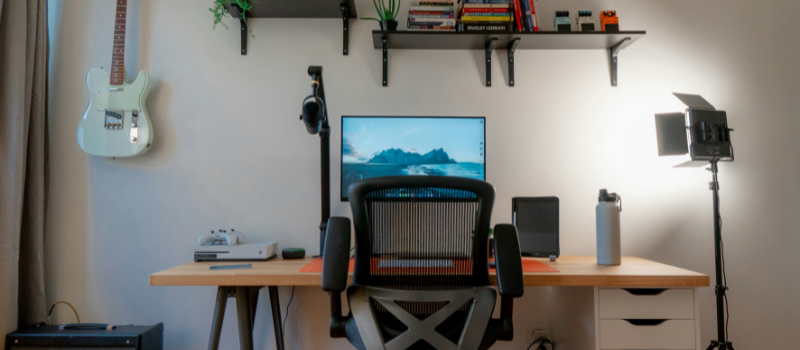You've read the same paragraph four times and still have no idea what it said. Your mind wandered to lunch plans, that awkward conversation from yesterday, and whether you remembered to lock your car (you didn’t) — all while your eyes track words on a page.
Sound familiar? Don’t worry: you’re not alone.
Your attention span didn't naturally shrink to 8 seconds. You trained it to be that way.
Every notification you answer, every tab you open mid-task, every time you pick up your phone "just for a second,” you are teaching your brain that focus is optional.
Fortunately, it’s not stuck like this. You can retrain it.
Real, high-quality focus isn't about grinding through distractions with gritted teeth, perspiration, and pure willpower. It's about understanding how attention actually works and creating conditions where deep concentration feels natural instead of impossible.
Below, we’ll walk through a few tried-and-true techniques to help you get focused, improve focus, and stay focused. Because starting is easy. It's the staying part that separates the deep workers from the perpetually distracted.
Let’s reclaim your brain.
What Focus Is (and Isn't)

Focus is the ability to direct your sustained attention to a single task, idea, or activity while filtering out distractions and irrelevant information. It’s the deliberate control of where your mental energy goes.
Focus isn't some mystical state where you become a meditative monk immune to all distractions. Though, that sure would be nice sometimes.
Really, it's the ability to direct your attention to one thing while your brain politely ignores everything else trying to steal the spotlight.
Think of focus like a flashlight in a dark room. You can point it anywhere, but it only illuminates one area at a time. The brighter and more focused the beam, the clearer you see what you're looking at. Scatter that light, and everything becomes dim and a bit fuzzy.
Focus is:
- Sustained attention on a single task or idea
- Your brain's ability to filter out irrelevant information
- A skill that gets stronger with practice
Focus isn't:
- Multitasking (that's actually rapid task-switching)
- Concentration that lasts forever without breaks
- Something you either have or don't have
Your brain has two main attention networks:
- Focused mode (laser-sharp concentration)
- Default mode (mind-wandering autopilot)
Most people spend their days ping-ponging between these states without realizing it. Mastering focus means learning to switch intentionally instead of letting your brain choose randomly.
And it’s 100% trainable (not fixed).
Why You Can't Stay Focused

Being unable to focus is your brain responding exactly as designed to a world that's actively working against sustained attention. It’s not a character flaw, just training.
Here are the real reasons you can’t focus:
- Attention Residue From Task Switching: Every time you switch between tasks, part of your attention gets stuck on the previous activity. Research by Dr. Sophie Leroy shows this "attention residue" can reduce cognitive performance by up to 40%. Your brain is literally still thinking about your email while trying to read that textbook.
- Digital Distractions Rewiring Your Brain: The average person checks their phone 96 times per day (at least) and switches between apps over 300 times daily. Each interruption triggers a dopamine hit that makes your brain crave more stimulation. You've basically trained your attention span to expect constant novelty instead of sustained focus.
- Mental Fatigue and Decision Overload: Your brain makes roughly 35,000 decisions per day, and each one depletes your mental energy. It’s no wonder your attention system is running on fumes by afternoon. Studies show that mental fatigue reduces focus capacity, and that explains why you can concentrate better in the morning than after lunch.
- The Novelty Bias Problem: Your brain evolved to notice new, potentially important information for survival. Unfortunately, that evolutionary wiring now works against you — every notification, sound, or movement triggers your brain's alarm, pulling focus away from whatever you're actually trying to do.
Techniques to Get Focused Better (and Stay Focused)
Productivity hacks and willpower tricks will only get you so far. They’re just band-aids to a slightly bigger problem. Instead, we’re going to focus (punny, right?) on techniques that work with your brain's natural attention systems instead of fighting against them.
1. The Attention Reset Protocol
Spend 2-3 minutes clearing your mental clutter before starting any focus work. Write down everything on your mind, close unnecessary tabs, and do a quick brain dump of worries or tasks. This prevents your brain from running background processes that steal attention.
Think of it as clearing your mental RAM before running a demanding program.
2. Environmental Design for Focus

Your environment controls your attention more than your willpower does. Remove visual distractions, silence notifications, and create a dedicated focus zone. Research shows that even having your phone visible (but silent) reduces cognitive performance. Put it in another room. Yes, it feels extreme, but that’s literally building your dedicated focus zone, and your brain feels that, too.
3. The Pomodoro+ Method
Work for 25 minutes, then take a 5-minute break…but with a twist. During breaks, avoid screens entirely.
Yep, that’s a major caveat.
Personally, I used to use my Pomodoro breaks to watch YouTube videos or read articles that interested me, but it wasn’t actually giving my overloaded brain a break at all.
Look out a window, stretch, or walk around. This gives your focused attention network time to recover instead of switching to a different type of stimulation. After 4 cycles, take a longer 15-30 minute break.
4. Single-Tasking Mastery
Do one thing at a time. Period. When you catch yourself trying to multitask, gently redirect your attention back to the primary task. Studies show it takes an average of 23 minutes to fully refocus after an interruption, so protect your single-tasking sessions.
5. Attention Anchoring

Create physical or mental cues that signal focus time to your brain. This might be:
- Putting on specific music (might I recommend Lord of the Rings LoFi beats)
- Lighting a candle
- Getting out your favorite pen and notebook
- Turning off your phone
- Taking three deep breaths
Your brain learns to associate these cues with concentrated work to make it easier to slip into focused mode automatically.
6. The Focus Recovery System
When your mind wanders (and it will), don't fight it or feel guilty. Simply notice the drift and gently guide your attention back to the task. Learning how to learn is hard work. You’re fighting a natural, addictive habit — this will take time, patience, and a healthy dose of self-compassion.
7. Energy-Based Focus Planning
Schedule your most demanding focus work during your peak energy hours. For most people, this is 2-4 hours after waking up. Use low-energy periods for routine tasks that don't require deep concentration.
You won’t know your exact energy flows from the get-go, and that’s fine. Experiment and track for a week to figure out your internal schedule. If mornings feel easy, that’s probably when you want to do your hardest focus work.
How to Build Your Personal Focus System
There’s no one-size-fits-all focus system. Something that works for someone else might not work for you at all, and vice versa. It’s all about finding what works for your brain and your life:
- Find Your Focus Killers: Track what derails your attention for 2-3 days. Is it your phone? Background noise? Mental fatigue at certain times? You can't fix what you don't measure.
- Pick Your Power Hours: Notice when you naturally feel most alert and focused. Block these times for your most demanding work. Protect them.
- Choose 2-3 Techniques Max: Start with Environmental Design (remove distractions) plus one other technique that resonates with you. Maybe it's the Pomodoro+ Method or Attention Anchoring. Master these before adding more.
- Design Your Focus Ritual: Create a consistent routine that signals focus time to your brain. This might be clearing your desk, putting on headphones, or doing your attention reset protocol. Make it simple and repeatable.
- Plan Your Recovery: Decide how you'll handle focus breaks and mind-wandering moments. Having a plan prevents you from spiraling when concentration inevitably dips.
- Track What Works: Keep a simple log of which techniques help and which don't. Your focus system should evolve based on real, personal data (not just other studies and research).
- Start Super Small: Begin with 15-minute focus sessions. Build consistency before trying to work for hours. Your brain adapts to reliable patterns.
Turn Attention Into Action
You now have the blueprint for sustained focus, but reading about concentration doesn't make you concentrated.
Stop letting distractions run your life. Your focused, productive self is waiting on the other side of that first 15-minute session.
Your brain builds focus through consistency, not perfection. Every time you successfully direct your attention back to the task, you're strengthening those neural pathways — and that makes your next focus session that much easier to enter (and maintain).
Start the timer. Focus begins now.
.png)

.png)
